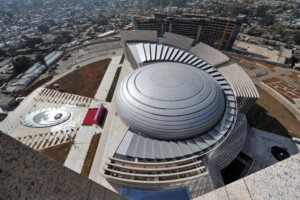June 3 Massacre commemorated with calls for justice and investigation results
Yesterday, Sudan commemorated what is known as the June 3/Ramadan 29 Massacre. A massacre in which over 127 protesters were killed, at least 100 went missing, and more than 700 were injured as armed forces used excessive violence to break up a peaceful sitting.
 210603 June 3 commemoration demo (social media)
210603 June 3 commemoration demo (social media)
Yesterday, Sudan commemorated what is known as the June 3/Ramadan 29 Massacre. A massacre in which over 127 protesters were killed, at least 100 went missing, and more than 700 were injured as armed forces used excessive violence to break up a peaceful sitting.
On June 3, 2019, two days before the end of Ramadan, the large sit-in in front of the army command to demand the military to cede power to a civilian government after the ousting of dictator Omar Al Bashir, was broken up with excessive violence. As Radio Dabanga reported yesterday, the massacre was commemorated on its second anniversary.
Marches and demonstrations took place in various cities in Sudan.

Hundreds of thousands of people took the streets in Khartoum to demand justice for those killed in anti-military protests in 2019.
They marched from central Khartoum towards the premises of the Council of Ministers. Ahead of the demonstrations, security forces had closed the main roads leading to the army headquarters in the Sudanese capital.
The protesters chanted slogans to demand justice for the martyrs and the wounded, and to demand the return of the more than 100 people that went missing during the violent dispersal.
The crowed also said that the government should step down if it fails to achieve the aspirations of the revolution.
Many protesters are still unhappy with the situation in the country and with the slow pace of the investigation into the massacre.
“We came here to mark the sit-in massacre and to show that even after al-Bashir’s ouster, people are still suffering"
“We came here to mark the sit-in massacre and to show that even after al-Bashir’s ouster, people are still suffering”, 24-year-old Eman Babiker, who complained of rampant unemployment, told the AFP news agency.
Resistance Committees and the employees of the National Health Laboratory staged a sit-in to demand the speeding up of the investigations and put those responsible to justice in court.

In Wad Madani, capital of El Gezira, demonstrations took place as well. Protesters chanted slogans demanding justice and retribution for the martyrs, the missing, and the injured as they marched from the south of Wad Madani, through Hospital Street, to the State Government Secretariat.
The protesters called on the leaders of the Forces for Freedom and Change (FFC), the Empowerment* Elimination, Anti-Corruption, and Funds Recovery Committee, and the wali (governor) of El Gezira to “alleviate the burden on citizens and achieve justice”.
Messages of support
Various politicians, ambassadors, and organisations used their platforms to call for justice.
Prime Minister Abdalla Hamdok said in a press statement yesterday evening that his government has worked hard to achieve justice. He admitted that “complicated ties” with security forces “has sometimes slowed down justice and delayed the submission of information” required by the investigations committee.
The Acting Wali (Governor) of the Blue Nile state, Jamal Abdel Hadi, said that the anniversary of the violent dispersal should be considered an opportunity to review the performance and the commitment of the authoritied in implementing the ideals of the revolution.
The Wali called for the urgent implementation of the slogans of the revolution to alleviate the burdens on the citizens of Sudan.
The new Charge D’Affaires at the UK Embassy in Khartoum, Louise Walker, posted on Twitter: "Today we honour those who lost their lives on 3 June 2019 at the revolutionary sit-in site in their struggle for a better future. The new Sudan must be built on justice and the UK supports the Transitional Government's commitment to deliver full accountability for 3 June".
"Moving forward requires serious, swift actions by Government to deliver justice and ensure accountability”
The Dutch Ambassador for Sudan, Irma van Dueren, also posted a message on Twitter: “Today marks the 2nd anniversary of the 3rd of June events in Sudan. We honor those who were killed or injured because of their determination on freedom. Moving forward requires serious, swift actions by Government to deliver justice and ensure accountability”.

May 11 protests
On May 11, a peaceful sit-in to commemorate the massacre was dispersed by authorities with excessive violence, killing two people and wounding over 37. The events sparked public outrage.
The Communist Party of Sudan demanded the resignation of the members of the government and called the event "a crime committed in cold blood, previously agreed on, for which the military and civilian sides in the government and the governor of Khartoum bear full responsibility”.
At the time, The Sudan Armed Forces (SAF) responded that “no instructions were issued to the forces protecting the army command to use live ammunition against the people” and that “what happened will be subject to investigation”.
* Empowerment (tamkin) is the term with which the ousted government of Omar Al Bashir supported its affiliates in state affairs by granting them far-going privileges, including government functions and the setting-up of various companies.











 and then
and then